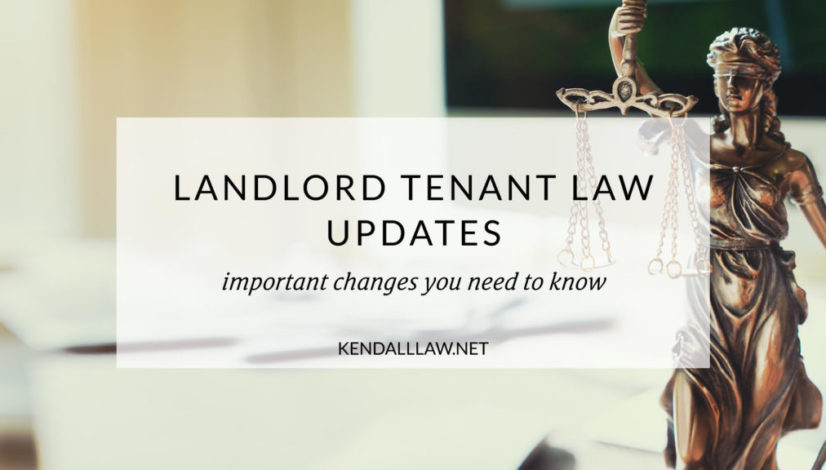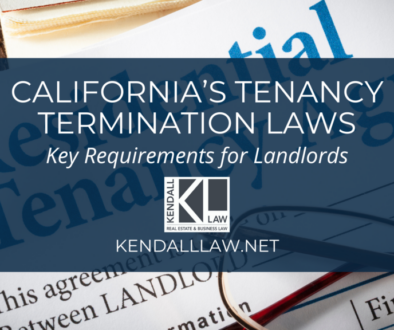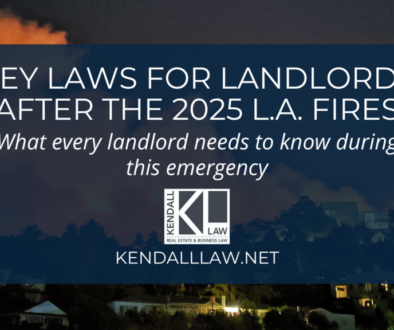Landlord Tenant Law Updates
Over the next few posts, we’re covering some of the important changes and updates in the law that real estate professionals and those who own real estate need to know.
Weekends and Holidays Excluded
Effective September 1, 2019 the time to act upon a Three-Day Notice to Pay or Quit or to Perform Covenant or in responding to unlawful detainer complaint now EXCLUDES Saturdays, Sundays, judicial holidays. This differs from the current law that includes those days when calculating the date to act. Code of Civil Procedure §§1161 and 1167.
Inspection of Decks, Balconies Stairways and Walkways
Civil Code §1954 and Safety Code §§17973 et seq requires that buildings with 3 or more multifamily dwelling units with decks, balconies, stairways and walkways must be inspected by a properly licensed person by 2025, and a subsequent inspection must be done every 6 years. The owner would have to make repairs if inspector found that the decks or balconies were in need of repair.
Installation of EVCS Parking Spot
Civil Code §1947.6 effective January 1, 2019 eliminates the exemption that the lessor of a dwelling to approve a written request of a lessee to install an EVCS (Electric Vehicle Charging Stations) at a parking spot allotted for the tenant subject to landlord’s procedural approval process. Under this new law the lessor of a dwelling subject to rent control to approve a written request of a lessee to instance an EVCS in accordance with specified requirements unless the dwelling is located in a local jurisdiction that, on or before Jan 1, 2018 adopted an ordinance requiring lessor of such dwelling to approve a written request of a lessee to install an EVCS.
Commercial Property- Disposal of Personal Property
The threshold calculation of the total resale value of the personal property is increased to either $2,500 or an amount equal to one month’s rent for the premises the tenant occupied, whichever is greater.
Commercial Property Abandonment
A commercial landlord can serve a Notice of Belief of Abandonment after the rent is unpaid for three days (at minimum, depending on the number of days the lease requires before a landlord may declare a default), and allows delivery of that notice by overnight courier. This notice will expire after 15 days regardless off form of delivery.
Expansion of Protection for Domestic Violence Victims
Expansion of protections for victims of domestic violence and other types of abuse to not face eviction or other penalties on the basis of having summoned law enforcement of 911 assistance on their own behalf, or on behalf of another, to respond to incidents of violence or abuse.
Landlord Must Accept Rent from Third Parties
No right of tenancy is created by the acceptance, nor is a landlord required to accept housing assistance programs such as section 8. To ensure that no right of tenancy is created, the landlord may condition acceptance of rent from a third party on a signed acknowledgement to that effect. Civil Code §1947.3.
Service Member Protections
A service member may terminate a lease when that person entered military service. A service member during the term of the lease who enters a period of military service, or while in a period of military service, executes the lease and then receives military orders for a permanent change of station or to deploy with a military unit, or as an individual in support of a military operation, for a period of not less than 90 days may terminate a lease. The termination of the lease under subdivision is effective 30 days after the first date on which the next rental payment is due and payable. Any person who receives a good faith request from a service member for relief and who believes the request is incomplete or otherwise not legally sufficient, or that the service member is not entitled to the relief requested, shall, within 30 days of the request, provide the service member with a written response acknowledging the request, setting forth the person’s basis for believing or asserting that the request is incomplete or not legally sufficient, or that the service member is not entitled to the relief requested.
Author: Eileen Kendall





